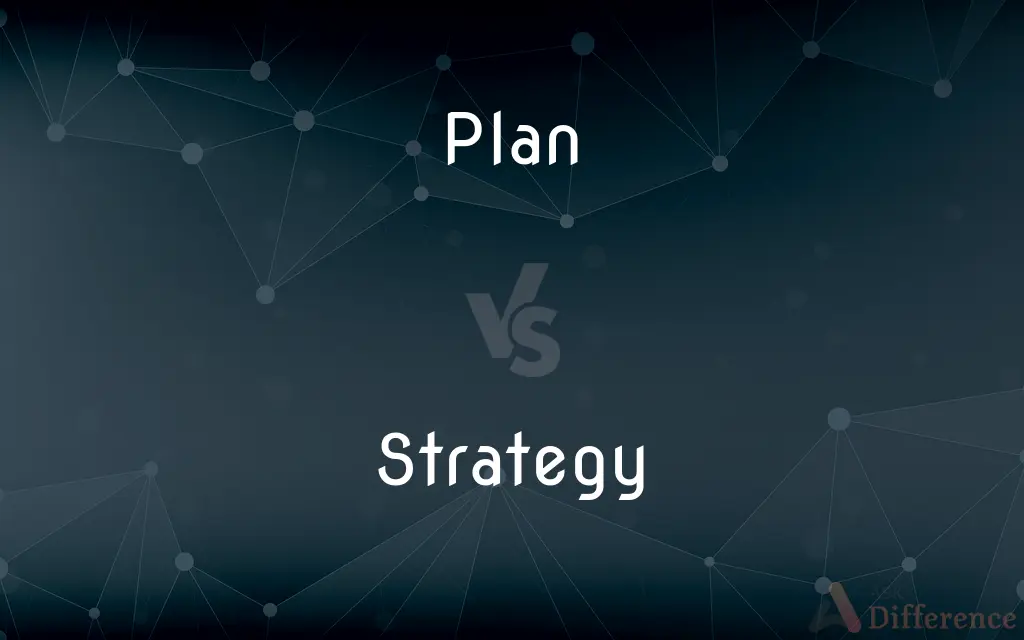Plan vs. Strategy — What's the Difference?
By Maham Liaqat & Fiza Rafique — Updated on March 20, 2024
Plan refers to a detailed proposal for doing or achieving something, focusing on specific steps and timelines, whereas strategy defines a high-level approach to achieve long-term objectives, emphasizing adaptability and overarching goals.

Difference Between Plan and Strategy
Table of Contents
ADVERTISEMENT
Key Differences
A plan is a detailed outline of steps, designed to achieve a specific goal within a defined timeframe. It includes specific actions, resources needed, and a sequence of steps. Whereas a strategy is more about setting long-term goals and determining the broad approach to achieve these goals. It's less about specifics and more about the overall direction.
Plans often include timelines, detailing when each step should be completed to achieve the desired outcome. Strategies, on the other hand, are more flexible, focusing on adaptability to changing environments rather than adhering to a strict schedule.
A plan is usually more tactical, addressing immediate and short-term objectives. It’s about the "how" in achieving a goal. On the other hand, a strategy looks at the bigger picture, aiming to establish a competitive position in the long term, focusing on the "why" and "what".
In implementing a plan, the focus is on efficiency and execution of tasks. Whereas in executing a strategy, the emphasis is on effectiveness and aligning efforts with overarching objectives, ensuring that actions taken are in service of broader goals.
Plans can be seen as subsets of a strategy. While a strategy outlines the general direction and goals, plans provide the detailed road map on how to get there, including specific actions and milestones.
ADVERTISEMENT
Comparison Chart
Focus
Specific steps and timelines
Long-term objectives and adaptability
Scope
Short-term, detailed
Long-term, broad
Main Concern
How to achieve specific goals
Why and what goals to achieve
Flexibility
Low, as it adheres to a strict schedule
High, adaptable to changes
Role in Execution
Tactical, focusing on efficiency
Strategic, focusing on effectiveness
Compare with Definitions
Plan
A detailed proposal for doing something.
The project plan outlines all the tasks required for completion.
Strategy
The art of planning and directing overall military operations and movements in a war or battle.
His strategy led them to victory.
Plan
A scheme or method for achieving something.
Their plan for the event includes a timeline of activities.
Strategy
An approach to achieving a long-term or overall aim.
Their marketing strategy targets a new demographic.
Plan
A detailed blueprint or program of action.
The construction plan specifies materials and timelines.
Strategy
The skill of making or carrying out plans to achieve goals.
Effective strategy requires understanding the competition.
Plan
A sequence of steps designed to achieve a specific goal.
Their plan to improve sales involves increasing marketing efforts.
Strategy
A method or plan chosen to bring about a desired future.
Adopting a digital strategy transformed their business.
Plan
A set of intended actions, usually detailed.
Their training plan includes a schedule of all the workshops.
Strategy
A high-level plan to achieve one or more goals under conditions of uncertainty.
Their strategy focuses on market expansion.
Plan
A plan is typically any diagram or list of steps with details of timing and resources, used to achieve an objective to do something. It is commonly understood as a temporal set of intended actions through which one expects to achieve a goal.
Strategy
Strategy (from Greek στρατηγία stratēgia, "art of troop leader; office of general, command, generalship") is a general plan to achieve one or more long-term or overall goals under conditions of uncertainty. In the sense of the "art of the general", which included several subsets of skills including military tactics, siegecraft, logistics etc., the term came into use in the 6th century C.E. in Eastern Roman terminology, and was translated into Western vernacular languages only in the 18th century.
Plan
An orderly or step-by-step conception or proposal for accomplishing an objective
A plan for improving math instruction.
Strategy
The science and art of using all the forces of a nation to execute approved plans as effectively as possible during peace or war.
Plan
A proposed or intended course of action
Had no plans for the evening.
Strategy
The science and art of military command as applied to the overall planning and conduct of large-scale combat operations.
Plan
A systematic arrangement of elements or important parts; a configuration or outline
A seating plan.
The plan of a story.
Strategy
A plan of action resulting from strategy or intended to accomplish a specific goal.
Plan
A drawing or diagram made to scale showing the structure or arrangement of something.
Strategy
The art or skill of using stratagems in endeavors such as politics and business.
Plan
In perspective rendering, one of several imaginary planes perpendicular to the line of vision between the viewer and the object being depicted.
Strategy
The science and art of military command as applied to the overall planning and conduct of warfare.
Plan
A program or policy stipulating a service or benefit
A pension plan.
Strategy
A plan of action intended to accomplish a specific goal.
Plan
To formulate a scheme or program for the accomplishment, enactment, or attainment of
Plan a campaign.
Strategy
The use of advance planning to succeed in politics or business.
Plan
To have as a specific aim or purpose; intend
They plan to buy a house.
Strategy
The science of military command, or the science of projecting campaigns and directing great military movements; generalship.
Plan
To draw or make a graphic representation of.
Strategy
The use of stratagem or artifice.
Plan
To make plans.
Strategy
An elaborate and systematic plan of action
Plan
A drawing showing technical details of a building, machine, etc., with unwanted details omitted, and often using symbols rather than detailed drawing to represent doors, valves, etc.
The plans for many important buildings were once publicly available.
Strategy
The branch of military science dealing with military command and the planning and conduct of a war
Plan
A set of intended actions, usually mutually related, through which one expects to achieve a goal.
He didn't really have a plan; he had a goal and a habit of control.
Plan
A two-dimensional drawing of a building as seen from above with obscuring or irrelevant details such as roof removed, or of a floor of a building, revealing the internal layout; as distinct from the elevation.
Seen in plan, the building had numerous passageways not apparent to visitors.
Plan
A method; a way of procedure; a custom.
Plan
A subscription to a service.
A phone plan
An Internet plan
Plan
(transitive) To design (a building, machine, etc.).
The architect planned the building for the client.
Plan
(transitive) To create a plan for.
They jointly planned the project in phases, with good detail for the first month.
Plan
(intransitive) To intend.
He planned to go, but work intervened.
Plan
(intransitive) To make a plan.
They planned for the worst, bringing lots of emergency supplies.
Plan
A draught or form; properly, a representation drawn on a plane, as a map or a chart; especially, a top view, as of a machine, or the representation or delineation of a horizontal section of anything, as of a building; a graphic representation; a diagram.
Plan
A scheme devised; a method of action or procedure expressed or described in language; a project; as, the plan of a constitution; the plan of an expedition.
God's plans like lines pure and white unfold.
Plan
A method; a way of procedure; a custom.
The simple plan,That they should take who have the power,And they should keep who can.
Plan
To form a delineation of; to draught; to represent, as by a diagram.
Plan
To scheme; to devise; to contrive; to form in design; as, to plan the conquest of a country.
Even in penance, planning sins anew.
Plan
A series of steps to be carried out or goals to be accomplished;
They drew up a six-step plan
They discussed plans for a new bond issue
Plan
An arrangement scheme;
The awkward design of the keyboard made operation difficult
It was an excellent design for living
A plan for seating guests
Plan
Scale drawing of a structure;
The plans for City Hall were on file
Plan
Have the will and intention to carry out some action;
He plans to be in graduate school next year
The rebels had planned turmoil and confusion
Plan
Make plans for something;
He is planning a trip with his family
Plan
Make or work out a plan for; devise;
They contrived to murder their boss
Design a new sales strategy
Plan an attack
Plan
Make a design of; plan out in systematic, often graphic form;
Design a better mousetrap
Plan the new wing of the museum
Common Curiosities
Is a strategy more important than a plan?
Both are important; a strategy provides the direction, while a plan provides the steps to achieve the objectives set by the strategy.
How do a plan and a strategy differ in focus?
A plan focuses on the specifics of achieving a goal, whereas a strategy focuses on setting long-term objectives and the approach to achieve them.
What role does efficiency play in plans and strategies?
Efficiency is crucial in executing plans, focusing on how resources are used, while effectiveness is key in strategies, aligning actions with overarching goals.
Do plans address long-term goals?
Plans typically focus on short to medium-term goals, serving as steps towards achieving longer-term strategies.
What is a plan?
A plan is a detailed outline designed to achieve a specific goal, focusing on specific actions and timelines.
What is a strategy?
A strategy is an overarching approach to achieve long-term objectives, emphasizing adaptability and broad goals.
Can strategies change over time?
Yes, strategies can and often do change over time to adapt to new challenges and opportunities.
Can a plan exist without a strategy?
While a plan can technically exist without a strategy, its effectiveness may be limited as it might not align with broader goals.
How does flexibility differ between a plan and a strategy?
Plans are less flexible and adhere to a schedule, whereas strategies are adaptable to changing circumstances.
Can a business have multiple strategies?
Yes, a business can have multiple strategies focusing on different aspects of its operations, such as marketing, product development, and expansion.
Why is adaptability important in strategy?
Adaptability allows a strategy to remain relevant and effective in the face of changing external conditions.
What is the role of a strategy in achieving competitive advantage?
A strategy helps in identifying and leveraging unique strengths and opportunities to gain a competitive advantage in the market.
How does a strategy influence decision-making?
A strategy sets the framework for decision-making, guiding the selection of actions that align with long-term objectives.
What makes a plan effective?
An effective plan is detailed, realistic, and aligned with strategic objectives, with clear steps and timelines.
How do plans and strategies interact?
Strategies define the overall direction and goals, while plans detail the specific actions needed to achieve these goals.
Share Your Discovery

Previous Comparison
Leaver vs. Lever
Next Comparison
Python vs. BoaAuthor Spotlight
Written by
Maham LiaqatCo-written by
Fiza RafiqueFiza Rafique is a skilled content writer at AskDifference.com, where she meticulously refines and enhances written pieces. Drawing from her vast editorial expertise, Fiza ensures clarity, accuracy, and precision in every article. Passionate about language, she continually seeks to elevate the quality of content for readers worldwide.














































